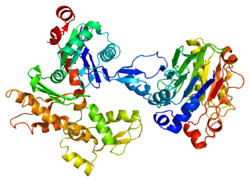Biology:T98G
T98G is a glioblastoma cell line used in brain cancer research and drug development.[1][2]
The T98G cell line was derived from a 61-year-old human male and has a hyperpentaploid chromosome count with a modal number ranging from 128 to 132. The cells are not tumorigenic in mice, but do proliferate with proper anchorage in cell culture.[1] T98G cells are known for having high expression of the ACTA2 gene, which is involved in cell motility and structure.[3] T98G cells are polyploidy variants of the parent T98 cell line, and can stay in the G1 phase of the cell cycle under stationary conditions.[1]
T98G cells have been investigated along with A172 cells for drug cytotoxicity,[3] and were found to be resistant to cisplatin, with larger cytotoxic effects induced by viral-mediated production of the p53 protein.[4]
References
- ↑ 1.0 1.1 1.2 Stein, Gretchen (April 1979). "T98G: An anchorage‐independent human tumor cell line that exhibits stationary phase G1 arrest in vitro". Journal of Cellular Physiology 99 (1): 43–54. doi:10.1002/jcp.1040990107. PMID 222778.
- ↑ "SOP: Thawing, Propagation and Cryopreservation of NCI-PBCF-CRL1690 (T98G)". PBCF. https://physics.cancer.gov/docs/bioresource/brain/NCI-PBCF-CRL1690_T98G_SOP-508.pdf.
- ↑ 3.0 3.1 Kiseleva, L (September 2016). "A172 and T98G cell lines characteristics". Cell and Tissue Biology 10 (5): 341–348. doi:10.1134/S1990519X16050072.
- ↑ Park, Jong; Kim, Tae (2002). "Cisplatin-Induced Apoptosis by Cisplatin in Human Glioblastoma Cell Line.". Journal of Korean Neurosurgical Society 31 (6): 574–584. https://www.jkns.or.kr/journal/view.php?number=2751.
External links
 |


